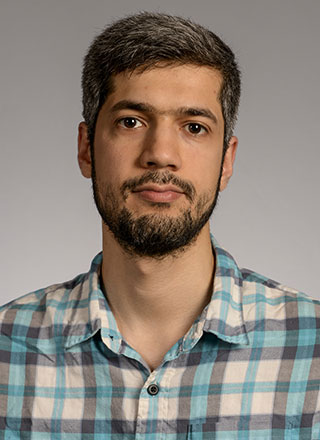May 31, 2021

Assistant Professor Hussein Nassar in the mechanical and aerospace engineering department recently won a prestigious National Science Foundation (NSF) Faculty Early Career Development Program (CAREER) grant. He received the award for his work on identifying unifying mathematical models that can explain the behavior of deployable structures. Research into these morphing metamaterials could aid in the designs of airbags, clothing, and even solar panels for space travel.
His work will examine geometry, shapes and structures to potentially find common mathematical properties that overstep chemical composition.
“We’re studying the sets of equations that will describe the behavior of these structures. Specifically, we are interested in the elastic behavior of these structures,” he said. “So, how do they bend, stretch, deform and deploy under different loading conditions, for instance.”
Nassar is just starting his work into this area. He sees this grant as an opportunity to pick up and expand upon his postdoctoral research he conducted into the repeating patterns of origami while studying in Paris.
“I like these theoretical questions. ‘Here’s a pattern. What shape can it fit?’ These questions can come from very different circumstances,” he said. “It can be asked by fashion designers determining the shape of a robe or dress or even cartographers trying to take a sphere and flatten it out.”
Folders Without Borders
NSF CAREER awards are for early-career faculty like Nassar “who have the potential to serve as academic role models in research and education” These faculty are expected to integrate education and research into their departments or organizations.
To help fulfill this part of the grant’s education and outreach requirement, Nassar will recruit graduate and undergraduate students to spark their interest in theoretical-based research.
Nassar also plans to develop a summer camp for youth ages 12 to 16 with help from The Connector, an MU-based unit dedicated to connecting UM System research with the people of Missouri who benefit from the science. The program, “Folders Without Borders,” will include hands-on activities such as computer-aided design, 3D printing and laser cutting.
“We’d like to have kids do origami folding to start. Then, tell them about potential applications in engineering, mathematics and even the arts,” Nassar said. “Mixing arts with engineering and mathematics can appeal to kids and get them interested in engineering in general.”
Nassar is the third Mizzou Engineering faculty member to receive an NSF CAREER grant in 2021, following civil and environmental engineering Assistant Professor Yaw Adu-Gyamfi and Assistant Professor Zheng Yan, who has joint appointments in the Department of Biomedical, Biological and Chemical Engineering and the Department of Mechanical and Aerospace Engineering.
The NSF grant, CAREER: Finite Elasticity of Morphing Metamaterials. Theory and Applications, totals $609,605 for the five-year grant.